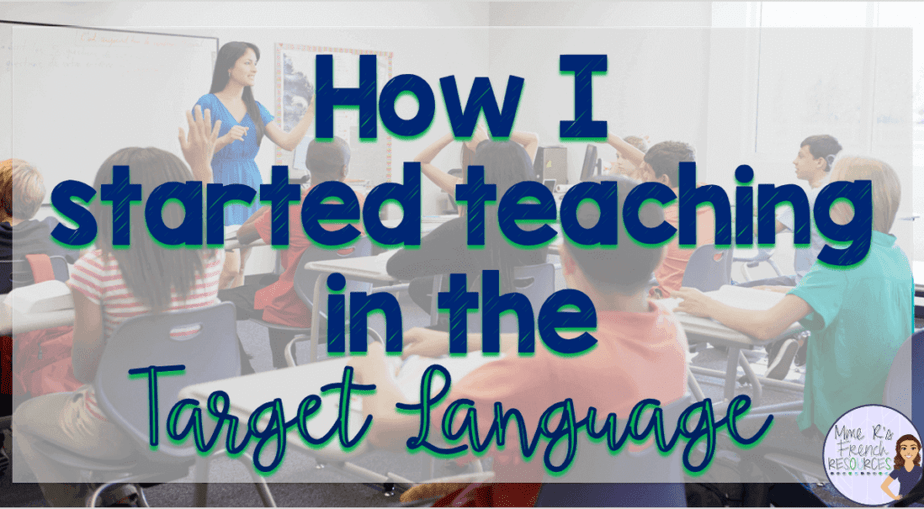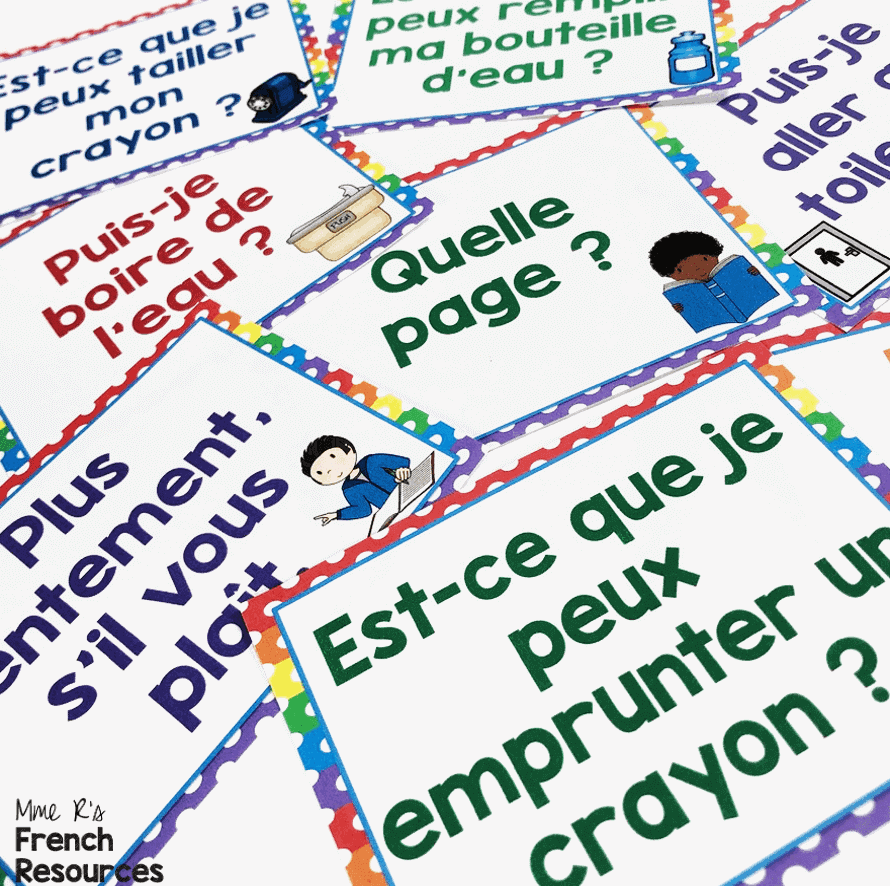
I didn’t start out teaching in the target language. I struggled a LOT with this when I first became a French teacher. How was I supposed to speak in French when they couldn’t understand me? Weren’t they going to give up? Weren’t they going to miss the instructions? I wanted so badly to do a good job, but teaching in the target language was just not natural for me.
Here’s how it all started out for me.
I wasn’t a certified teacher when I began teaching. I had been planning to be an English teacher in France, but falling in love meant I left France and moved back to the U.S. to get married. While I didn’t really want to teach English to English-speakers (although I did for a while), I loved all aspects of language teaching. As a French-speaker, it only seemed natural to find a job teaching French to American students.
I had no idea it would be so HARD!!!
I got hired with a provisional certification, meaning I could teach without a full certificate, provided that I complete the coursework to complete accreditation through night classes while I was teaching. Having always been a good student, I told myself that it couldn’t be difficult.
The actual coursework was really easy. I mean, I was learning about teaching AS I was doing it everyday. I had so many beginning PD sessions combined with the coursework that I was getting so much information so fast. In order to keep this provisional license, I had to undergo a TON of observations from the administration, professors at the university, and a few of my advisors. It felt like someone was always in my room!
I don’t say that because it’s a bad thing. I absolutely think anyone in my situation should have a lot of support, because I did not know what I was doing! Honestly, no books could teach me as much as the experience was, but the pressure to become a good teacher quickly was huge! I mean, I was in charge of an entire program, and all the students were depending on me.
My early teaching challenges
I had textbooks that were thirty years old, and the first year book didn’t even coordinate with the second year book. What did that mean for me? Well, my students couldn’t even understand most of the second year book, so I couldn’t use it.
I had to write all the materials, because back when the internet was in its infancy, there was no way to find good materials online. I also had to figure out what I was supposed to be teaching, because we had no curriculum.
So, I set out to teach the vocabulary, verbs, and grammar that I thought students needed to know. I made worksheets. I made games. When I wanted to teach some culture, I borrowed VCR tapes from the library. (I am that old.) I thought I was doing a good job. The kids really seemed to like it. We had a lot of fun and they were doing great on my written quizzes.
BUT
Of course I was missing something huge! I wasn’t teaching in the target language. Like, at all. I pretty much only spoke English in their class. It wasn’t like I couldn’t speak French. I had just moved from France! The problem was, I didn’t think they would understand me if I spoke French. So I didn’t. And guess what happened? My students never spoke French, either.
I didn’t even realize it until my advisor, a Spanish teacher from the education department where I was getting my Master’s degree, was pretty harsh with me after she observed my class one day. She pretty much told me I was not doing a good job, because I never spoke the target language.
She wasn’t wrong, but I felt so defeated. I mean, how was I supposed to speak the target language with students who didn’t understand me? It wasn’t like I had the easiest group to begin with, so to throw that into the mix seemed terrifying. I had JUST gotten classroom management down (a little bit).
What did I do?
I made a resolution to get them speaking more French and to begin teaching in the target language at least part of the time. I didn’t have a goal for how much, because at that time, anything would have been an improvement.
The first thing I did was make some posters to hang in my room. I used these signs to help them use basic expressions, such as I need help, I have a question, or Please repeat that. It’s an easy way to support students as you encourage them to speak the target language.
CLICK HERE to find my French classroom expressions posters.
From there, each week, I used a few new basic expressions to give them directions, like:
Ouvrez vos livres à la page__________.
Levez la main.
Levez-vous.
Écrivez.
Each week, we focused on three to five new directions, and pretty soon, I was able to speak a LOT more of the target language with them! In turn, they were also using a lot of basic expressions in class, so it was working!
How did my students react when I began teaching in the target language?
Honestly, right away, some of them quickly decided they no longer liked me. They thought it was all fun to play bingo or have board races for vocabulary, but now they had to work harder.
I got some attitudes. I definitely had a few who put their heads down and ignored me. Some told me I was boring. Some told me what I was doing didn’t matter and that my class was dumb. I went home and cried more than a few times. BUT, I did not give up.
You see, I couldn’t. If all I was doing was asking them to memorize vocabulary and verbs, I wasn’t teaching them to actually do much of anything WITH the language. I knew I needed to do better.
The benefits of using the target language?
Suddenly, I was reaching students who I hadn’t before. Those students who hate to write but love to speak suddenly got so engaged. They wanted to participate. They even began to do their homework, because hearing the language so much helped them understand in a way that they hadn’t before.
By asking them to use the target language for everyday tasks, and by using more of the target language in the classroom, it helped French become less awkward for them, and we actually began to do a lot more French speaking activities.
One thing I wish I had known:
Something I came to realize was that I was often too worried about using the language that students would know. Irregular verbs come up often in language, but often textbooks won’t introduce some of the most common verbs until well into the second year of language learning.
By using common verbs often (like je veux, je connais, or je dois) when I spoke, my students started to use them, too. I didn’t formally teach them for a long time, but when I did, students got it so much faster!
So, don’t be afraid to use words they don’t know. It will only help them later on when they do formally learn them!
Get some tips for fostering oral communication in your French class here.
Good luck on your journey into teaching in the target language!


Jill Tully says
Ashley, I really thought I was reading my own story for a bit there. I, too, had just moved from a francophone country (Senegal) where I had been teaching English. I didn’t have a teaching degree, but got an Emergency license and took night classes. It seems like EVERYONE observed me in my first year. And I had NO materials (or Internet – I’m old, too)! What a struggle!
But I found that I spoke a lot more French with my students then than I do now after 20+ years of teaching. I honestly think it’s because I haven’t lived in a situation where I’m speaking French all the time in so long. I don’t feel comfortable speaking it anymore and I know I’ve forgotten a lot of vocabulary.
Your blog encourages me to get back to using more French! Thank you so much!
Mme Jill Tully
Indiana
Ashley says
Thanks for sharing your story, Jill!
I agree that it can be hard to stay in the language when we are mostly with students who don’t speak French. Maybe you can find a French tv show to watch or get a few new books so you can spend some time with French that isn’t related to a textbook.
Best of luck! A little bit at a time will still get you there. 🙂
Marguerite says
Thank you for your story, very inspiring. Me and my husband speak French. We are Senegalese. And wanted my girls to speak it. They understand everthing. I love all your materials and use ithem often.
Super helpful. .
Thanks again for sharing
Marguerite
Ashley says
Thank you so much, Marguerite! I’m so glad the resources are so helpful!
My husband speaks only English, so my son thinks it is really fun to have a special language he can use with me. I’m thankful for all his teachers who have helped him with French, because it’s not always easy to keep a language going in a home where the parents speak different languages. He loves speaking French, because he really admires all his teachers, and that makes it really easy for me to keep it up at home. 🙂
Madame says
So inspiring! I had taught all in French last year, and on some levels it was a success, but I definitely “lost” a few students along the way. Then came Online-teaching, and it threw me completely back into English. After reading your blog, I have new hope. I will start back up in French!
Ashley says
Thanks for sharing your story! I know it can be hard to stay in all French! I was lucky enough to teach immersion for years, and for a long time, they didn’t even know I spoke English! That definitely made it easier.
I know that distance learning has brought a lot of new challenges to teaching in French, so give yourself grace and get back to it when you can. I’d have a hard time with it right now, too, because kids are already stressed. Maybe just start with some basic directions and explain a little bit in French with English support.